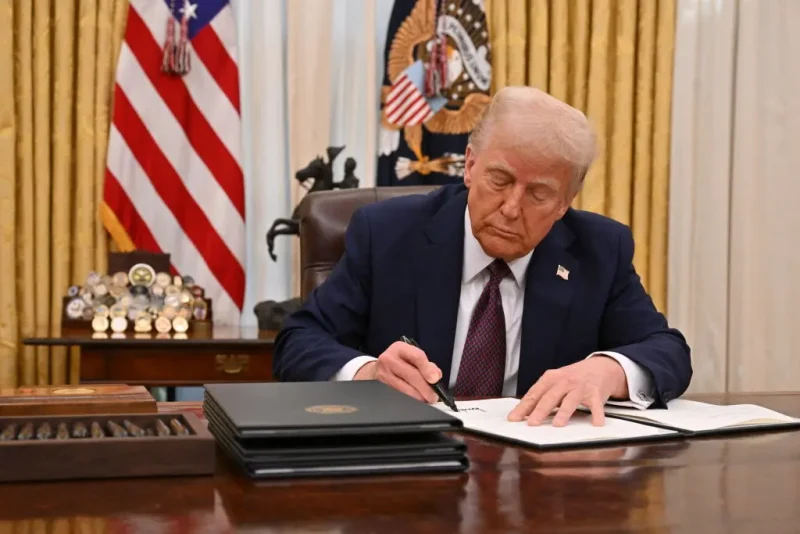🔴 Website 👉 https://u-s-news.com/
Telegram 👉 https://t.me/usnewscom_channel
OAN Commentary by: Mehek Cooke
Monday, February 17, 2025
To protect and ensure American businesses are not left at a competitive disadvantage in the global marketplace, President Trump recently signed an executive order to halt an outdated, 50-year-old law known as the Foreign Corrupt Practices Act (FCPA). This overly restrictive law from 1977 prohibits U.S. companies from offering financial incentives to foreign officials to secure or retain international business. The temporary suspension will remain in effect until the Department of Justice provides clearer guidance on how the law should apply in today’s global economy.
Advertisement
President Trump is right: these prohibitions severely disadvantage American corporations because such activity is everyday practice in international business transactions.
Many foreign firms operate in jurisdictions where gratuities, if not bribery, are legal, customary, or tacitly accepted. As a result, American businesses are often outmaneuvered in securing massive contracts simply because they adhere to the stricter regulations not imposed on their competitors. This imbalance results in lost revenue, fewer jobs, and diminished global influence for U.S. companies.
The action disturbed the sensibilities of much of the media, resulting in headlines such as “Trump Green-Lights Bribery and Corruption With New Executive Order” and “Trump orders Justice Department to stop enforcing foreign anti-bribery law,” However, the reality is far more complicated. The order represents a strategic and measured response to an antiquated law that no longer serves its intended purpose.
Consider the case of Walmart in 2019, The company agreed to a staggering $282 million settlement with the DOJ and SEC over FCPA violations related to alleged bribery in Mexico, Brazil, and India. Walmart executives were accused of making routine “facilitation payments” to expedite building permits and approvals, a standard part practice of business conduct in those countries. While Walmart paid hundreds of millions in fines, its foreign competitors—many of whom engage in similar practices—continue to operate freely without fear of U.S. enforcement. This persistent disadvantage leaves American retailers at a competitive loss, particularly in emerging markets where such practices are the norm.
Goldman Sachs also faced draconian consequences when it agreed to pay over $2.9 billion in penalties after its executives allegedly provided kickbacks to secure lucrative business deals in Malaysia. While the U.S. took decisive action against Goldman Sachs under the FCPA, many foreign banks that participated in similar practices avoided severe penalties and ultimately secured the business. This costs American jobs and hampers American prosperity.
If American companies are excluded from these opportunities, the beneficiaries are not ethical business practices, but regimes that oppose U.S. interests and values. This undermines American global influence while rewarding foreign competitors like China secure contracts that should go to American firms. We can’t continue allowing these countries to benefit at the expense of American businesses, jobs, and national interests.
While pausing the FCPA is sound policy, it is not the only action President Trump should take to ensure American competitiveness. Just as the Biden administration aggressively prosecuted Americans through its overly expansive reading of the statute, the Federal Trade Commission and DOJ have hindered American economic competitiveness in recent years by expanding antitrust enforcement, empowering our foreign competitors in the process. The president should reverse course here as well.
For instance, just recently, the Wall Street Journal Editorial Board recently expressed distaste that the DOJ would seemingly prefer China’s Huawei —accused of espionage and criticized for its close ties to the Chinese Communist Party and the People’s Liberation Army — to retain its 30% global market share rather than allowing American company HPE-Juniper to scale and compete. This is a textbook example of the DOJ prioritizing ideology over America’s competitiveness.
This is just one of many DOJ/FTC antitrust overreach cases.
The DOJ’s antitrust scrutiny of American semiconductor companies has also hindered the U.S. competitiveness with China, which is investing heavily in its semiconductor industry with state-backed resources. While American firms contend with burdensome legal challenges, China’s chipmakers continue to gain market share and technological advantage.
The unnecessary hurdles created by the DOJ and FTC are wrong and continue to enable foreign competitors to gain traction faster.
To maintain America’s position as the world’s leading economic power, the Trump administration must overhaul Biden’s antitrust policies to prioritize U.S. competitiveness. Without this shift, burdensome regulations will stifle innovation and investment, surrendering strategic industries to foreign adversaries.
(Views expressed by guest commentators may not reflect the views of OAN or its affiliates.)
Cooke, an attorney and political strategist, is a surrogate for the Trump for President Campaign and the Republican National Convention.
Advertisements below
